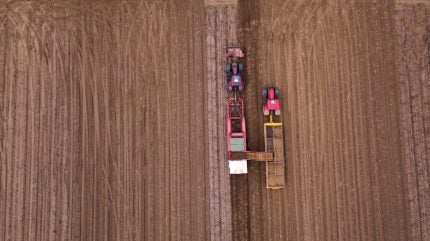
A top-level review of the UK’s Seasonal Worker Scheme (SWS) has concluded there is a need for the initiative to be retained in the short-to-medium term.
But government advisers on the Migration Advisory Committee, which compiled the report, recommend that more flexibility around visas is required to “enable employers to plan more efficiently”.

Discover B2B Marketing That Performs
Combine business intelligence and editorial excellence to reach engaged professionals across 36 leading media platforms.
Another recommendation is that the newly-elected Labour government should investigate whether the food sector should cover migrant workers’ upfront costs.
The current SWS began life as a pilot in 2019 and will run until at least 2029.
It was an acknowledgement that the end of the free movement of labour between the UK and the EU post-Brexit has left certain agri-food sectors – such as fruit and vegetable growing and meatpacking – facing a shortage of workers, leading to food security fears about supplies on supermarket shelves.
But the scheme has been criticised by some in the food industry for being inflexible around visa requirements and for being too focused on agriculture.

US Tariffs are shifting - will you react or anticipate?
Don’t let policy changes catch you off guard. Stay proactive with real-time data and expert analysis.
By GlobalDataHowever, those seeking its expansion may not have been encouraged by the Labour Party’s pre-election manifesto.
The now-government said it planned to reduce net migration and indicated it would take a tougher approach to employers relying on foreign labour.
“We will reform the points-based immigration system so that it is fair and properly managed, with appropriate restrictions on visas and by linking immigration and skills policy. Labour will not tolerate employers or recruitment agencies abusing the visa system,” it said.
Labour said it would ensure that migration to address skills shortages “triggers a plan to upskill workers and improve working conditions in the UK”.
And it warned: “The days of a sector languishing endlessly on immigration shortage lists with no action to train up workers will come to an end.”
Perhaps with such rhetoric in mind, the Migration Advisory Committee said: “Further certainty is required from government regarding the long-term future of the scheme, which can be achieved by confirming visa numbers and any further extension to the scheme on an annual basis – effectively giving employers and businesses five years’ notice if the scheme is to close.”
It added: “The criteria by which future visa numbers could be tapered must also be made clear. We do not recommend changes to the scheme’s eligible occupations.”
On the flexible visa point, the Migration Advisory Committee said: “Greater flexibility would enable employers to plan more efficiently and for workers to maximise their earnings without adding complexity to the route.”
It suggested this could be achieved by shortening the current ‘cooling-off’ period from the current six months to three months and allowing employees to work any six-month period in an individual calendar year.
It also recommended seasonal workers are guaranteed at least two months’ pay to cover their costs in coming to the UK and reduce the risk that low-income workers are required to take.
The review said the new government should give consideration to the Employer Pays Principle, whereby the agri-food sector should cover migrant workers’ upfront costs.
“Seasonal workers currently bear the cost of both their visa and their travel to and from the UK – costs which can be considerable and which increase the risk of debt bondage. Further work is needed to investigate how these costs might be more equitably shared along the supply chain,” it said.
In conclusion, the Migration Advisory Committee said: “Ultimately, we believe that if the government intends to maintain current levels of domestic food production then there is a clear need for a SWS in the short-to-medium term.
“This will provide certainty to businesses which operate in a sector unusually reliant on migrant labour, given the lack of domestic workers and the seasonal and rural nature of the work.
“If the new government wishes to reduce the reliance on migrant labour whilst maintaining domestic food production and supporting rural economies in the long-term, then it must ensure there are appropriate policies and an environment for encouraging automation of these roles.”
Responding to the review, Rod Addy, director general of the dairy-, meat- and seafood-focused Provision Trade Federation (PTF), said: “While we recognise the vital need to address worker shortages at farm level to ensure initial supply, it is equally important that the supply of workers to all parts of the supply chain must be maintained, particularly at peak times such as the run-up to Christmas.
“Allowances for poultry processors are necessary. However, it is not just the poultry sector that is challenged to recruit workers but pork and dairy as well. We do not want to hold back productivity by impeding the flow of staff at all levels to these sectors.
“The PTF does not support the existence of a low-paid, low-skilled workforce but the journey towards automation requires a transition period and there needs to be a recognition that stemming the flow of overseas workers would not aid that process and many prospective UK domestic candidates are not attracted to production line roles.”





